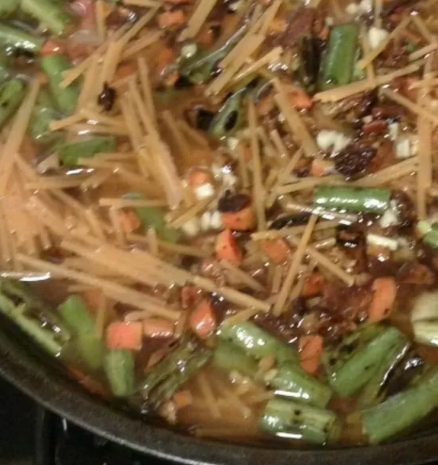Cascadia Fideuà: A Fusion of Flavor in Every Bite
Prepare your taste buds for a culinary journey with our Cascadia Fideuà recipe—a delightful blend of Spanish tradition and Pacific Northwest influences. Originating from the coastal regions of Catalonia, Fideuà traditionally features short noodles and a variety of seafood. In this Cascadian twist, we incorporate locally sourced ingredients to create a dish that harmonizes the richness of Spanish flavors with the freshness of the Pacific. Join us as we explore the depths of this gastronomic adventure, from the aromatic saffron-infused broth to the tantalizing combination of pancetta and locally sourced vegetables.
Ingredients:
- 3 cups chicken stock, or more if needed
- 2 cloves garlic, minced
- 1 pinch saffron
- 1 cup pancetta bacon, diced
- 2 tablespoons olive oil, divided
- ½ cup diced carrots
- ½ cup frozen artichoke hearts, thawed
- ½ cup fresh green beans
- 2 cups diced white onion
- Salt and black pepper to taste
- 2 cups diced tomatoes
- 1 (16-ounce) package spaghetti, broken into 2-inch pieces
Instructions:
Step 1: Pacific Broth Bliss
- In a saucepan, bring chicken stock to a gentle simmer. Add minced garlic and a pinch of saffron, infusing the broth with aromatic goodness. Keep the broth warm over low heat.
Step 2: Pancetta Prelude
- In a large, deep skillet, cook diced pancetta over medium heat until it turns golden brown and releases its flavorful oils. Remove pancetta from the skillet and set it aside.
Step 3: Olive Oil Elegance
- In the same skillet, add 1 tablespoon of olive oil. Sauté diced carrots, thawed artichoke hearts, and fresh green beans until they begin to soften. Season with salt and black pepper to taste.
Step 4: Onion Opulence
- Introduce diced white onion to the skillet, cooking until translucent and fragrant. The medley of vegetables should be a symphony of colors and textures.
Step 5: Tomato Tango
- Stir in diced tomatoes, allowing them to meld with the vegetables and release their juices. Let the mixture simmer for a few minutes.
Step 6: Noodle Nesting
- Add the broken spaghetti pieces to the skillet, ensuring they are evenly distributed among the vegetables.
Step 7: Pacific Fusion
- Pour the saffron-infused chicken stock over the vegetable and noodle mixture, ensuring the noodles are submerged. Adjust the liquid if necessary; the noodles should absorb the flavorful broth.
Step 8: Simmering Symphony
- Cover the skillet and let the Fideuà simmer over low heat. Stir occasionally to prevent sticking, and add more chicken stock if needed.
Step 9: Pancetta Reunion
- When the noodles are al dente and have absorbed the Pacific-infused broth, reintroduce the cooked pancetta to the skillet, stirring to incorporate its savory essence.
Cook Notes and Variations:
Cook Notes:
- The key to a perfect Fideuà is achieving a socarrat—a slightly crispy layer of noodles at the bottom of the skillet. Increase the heat slightly towards the end to achieve this.
Variations:
- Seafood Spectacle: Enhance the dish by incorporating seafood such as clams, mussels, or shrimp for a traditional touch.
- Vegetarian Voyage: Create a vegetarian version by omitting the pancetta and incorporating a variety of vegetables.
Keto and Low-Carb Versions:
Keto Version:
- Replace traditional spaghetti with a low-carb alternative like zucchini noodles or shirataki noodles.
- Ensure the chicken stock used is low in carbohydrates.
Low-Carb Version:
- Opt for a low-carb noodle substitute and adjust the quantity of vegetables to reduce carb content.
- Choose a pancetta with minimal added sugars.
Frequently Asked Questions (FAQs):
Q1: Can I use vegetable broth instead of chicken stock? A1: Yes, vegetable broth can be a suitable alternative, especially for a vegetarian version.
Q2: Can I make Fideuà ahead of time? A2: While Fideuà is best enjoyed fresh, you can prepare components in advance and assemble just before serving to preserve the noodle texture.
Q3: Can I freeze Fideuà leftovers? A3: Freezing may affect the texture of the noodles, but you can refrigerate leftovers for up to two days.
Q4: What’s the best way to achieve a socarrat? A4: Increase the heat slightly towards the end of cooking, allowing the bottom layer of noodles to develop a crispy texture.
Q5: Can I customize the vegetables used in Fideuà? A5: Absolutely! Feel free to experiment with your favorite vegetables or seasonal produce.
In the fusion of Cascadian and Spanish culinary traditions emerges a dish that captures the essence of two distinct regions—the Cascadia Fideuà. From the saffron-kissed broth to the locally sourced vegetables, every element harmonizes to create a symphony of flavors. Whether you’re savoring the richness of pancetta or the Pacific freshness of green beans, each bite is a celebration of the culinary diversity found along the coast. So, gather your ingredients, embrace the fusion of flavors, and embark on a gastronomic journey with Cascadia Fideuà—a culinary masterpiece that transcends borders and tantalizes the taste buds. ¡Buen provecho!

